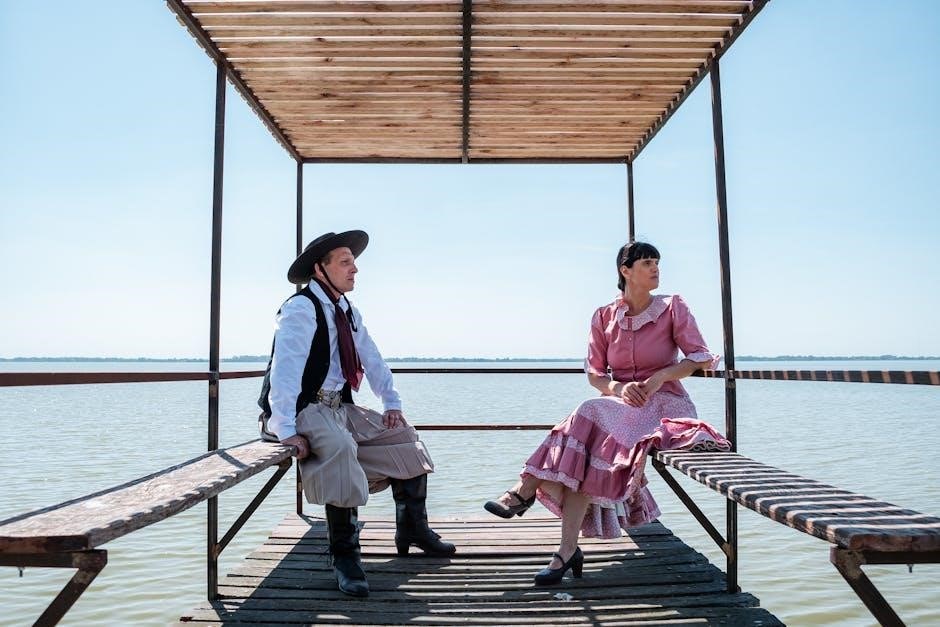Feminism has reshaped the understanding of gender roles, emphasizing the social construction of masculinity and its intersection with power dynamics. It challenges traditional norms, fostering equality and solidarity.
The Emergence of Masculinity Studies in Feminist Discourse
Masculinity studies emerged as a response to feminist critiques of gender roles, shifting the focus from women’s experiences to include men’s identities. Feminist theories laid the groundwork for examining how masculinity is socially constructed and intertwined with power dynamics. This shift challenged traditional views, emphasizing that masculinity, like femininity, is not innate but shaped by cultural and societal norms. The rise of masculinity studies within feminist discourse highlighted the need to understand men’s roles in perpetuating or challenging gender inequalities. By analyzing masculinity, scholars aim to dismantle harmful stereotypes and promote gender equality. This field has evolved to address diverse masculinities, including intersections with race, class, and sexuality, fostering a more nuanced understanding of gender systems.
Understanding the Intersection of Sexuality and Gender Roles
The intersection of sexuality and gender roles reveals how societal expectations shape identities and behaviors. Traditional masculinity is often tied to heteronormativity, marginalizing those who deviate. This narrow definition enforces rigid norms, restricting emotional expression and perpetuating harmful stereotypes. Feminist theory critiques these constructs, emphasizing the fluidity of gender and sexuality. By challenging these norms, feminist discourse opens space for redefining masculinity and fostering healthier expressions of identity. This intersection highlights the need for inclusive understanding, promoting equality and breaking free from restrictive gendered expectations. The interplay between sexuality and gender roles remains central to feminist analysis, offering insights into power dynamics and social change. Addressing these intersections is crucial for building a more equitable society where diverse identities are valued and respected.
Historical Context of Masculinity and Feminism
The emergence of masculinity studies within feminist discourse traces back to the 20th century, highlighting evolving gender roles and societal norms shaped by historical movements.
The Evolution of Masculinity in Response to Feminist Movements

The rise of feminist movements has led to a redefinition of masculinity, challenging traditional gender norms. Men have begun to reflect on their roles, embracing more nuanced identities. Feminist theories have influenced this shift, encouraging men to question power dynamics and embrace emotional expression. The concept of “nuevas masculinidades” emerged, emphasizing change and reform. However, resistance persists, as some men struggle with adapting to these changes. Education and emotional intelligence are key strategies for fostering modern masculinity. These shifts highlight the interconnectedness of gender roles and societal expectations, urging men to align with feminist goals for equality. The evolution of masculinity reflects a broader cultural movement toward inclusivity and solidarity.
Key Theoretical Frameworks: From Feminist Theory to Masculinity Studies
Feminist theory has laid the foundation for understanding gender inequalities, emphasizing the social construction of roles. Scholars like MV Vigoya and JA Jiménez Rodas highlight how gender power dynamics shape identities. These frameworks explore masculinity as a construct, influenced by societal expectations and power imbalances. Early studies on masculinity drew from feminist theories, challenging traditional views of male dominance. The concept of “género y poder” emerged as central to analyzing these inequalities. Feminist theories have also inspired contemporary masculinity studies, urging a critical examination of male roles in society.
These frameworks emphasize the need to redefine masculinity, fostering emotional expression and solidarity; They advocate for education and reflection to dismantle harmful gender norms, aligning masculinity studies with feminist goals of equality and inclusivity;

Theoretical Perspectives on Gender and Power
Theoretical approaches analyze gender as a social construct, emphasizing power imbalances. Feminist theories highlight how gender roles reinforce inequalities, shaping identities and societal structures.
- These frameworks explore how power dynamics influence gender norms and behaviors.
Género y Poder: The Core of Gender Inequality Debates
Género y poder lie at the heart of gender inequality debates, highlighting how societal structures and norms perpetuate disparities. Traditional masculinity, often associated with dominance, reinforces unequal power dynamics, limiting both men and women. Feminist theories emphasize how gender roles are socially constructed, perpetuating systemic inequalities. The intersection of gender and power explores how masculinity is often tied to control and authority, while femininity is associated with submissiveness; These dynamics shape access to resources, opportunities, and decision-making processes. Resistance to these structures is evident in feminist movements, which challenge traditional norms and advocate for equality. Understanding these power imbalances is crucial for dismantling gender inequality and fostering a more equitable society.
- Education and emotional intelligence are key strategies for challenging these norms.
Feminist Theories and Their Impact on Contemporary Masculinity Studies
Feminist theories have profoundly influenced contemporary masculinity studies by challenging traditional gender norms and power structures. These theories initially focused on women’s experiences but later expanded to critically examine men’s roles and identities. Feminism highlighted how masculinity is socially constructed, often tied to dominance and control, perpetuating inequality. This critique has led to the emergence of critical masculinities, which question toxic norms like emotional repression and aggression. Feminist frameworks also explore how men navigate changing gender roles, addressing issues like mental health and relationships. By fostering dialogue on gender equality, feminist theories have reshaped masculinity studies, promoting more inclusive and nuanced understandings of male identities.
- Feminist ideas encourage men to embrace vulnerability and challenge harmful stereotypes.

Men’s Reactions to Feminist Changes
Men have shown varied reactions, from resistance to adaptation, as feminism challenges traditional gender roles. Some embrace critical masculinities, while others cling to harmful stereotypes.
Resistance and Adaptation: How Men Have Responded to Feminism
Men’s responses to feminism have varied, ranging from resistance to adaptation. Some men resist feminist changes, clinging to traditional masculinity and viewing feminism as a threat to their power and identity. This resistance often manifests in backlash movements, such as anti-feminist groups or ideologies that emphasize male supremacy. Others have adapted, embracing critical reflections on masculinity and aligning with feminist principles to promote gender equality. Education and emotional intelligence have emerged as key strategies to help men adapt, fostering healthier masculinities and reducing harmful stereotypes. These responses highlight the complex interplay between masculinity and feminism, revealing both challenges and opportunities for societal change.
From Machismo to Critical Masculinities: A Shift in Perspective
The shift from machismo to critical masculinities reflects a growing awareness of the limitations of traditional masculinity. Machismo, rooted in dominance and emotional suppression, has been challenged by feminist critiques, urging men to question harmful gender norms. Critical masculinities emerge as a response, encouraging men to embrace vulnerability, empathy, and equality. This perspective rejects toxic masculinity, promoting instead a more inclusive understanding of gender roles. By engaging with feminist theories, men can redefine masculinity in ways that align with social justice and personal well-being. This transformation is not only about challenging societal expectations but also about fostering healthier identities that benefit both individuals and communities.

Social and Cultural Implications of Gender Roles
Gender roles shape societal expectations, influencing behavior, opportunities, and cultural norms. They often perpetuate inequalities, limiting individuals’ potential and reinforcing power imbalances within communities and institutions.
The Role of Education in Shaping Masculinity and Femininity
Education plays a pivotal role in shaping gender identities by reinforcing or challenging societal norms. Traditional curricula often perpetuate gender stereotypes, limiting individuals’ potential. For instance, boys are frequently encouraged to pursue STEM fields, while girls are steered toward arts and humanities. This systemic conditioning influences career choices, self-perception, and interpersonal dynamics. However, progressive educational approaches are emerging, emphasizing gender equality and inclusivity. By incorporating diverse perspectives and questioning norms, education can dismantle rigid gender roles. This shift fosters emotional intelligence, mutual respect, and healthier masculinity, ultimately contributing to a more equitable society. The classroom becomes a space for redefining gender and fostering solidarity.
Cultural Narratives: Constructing Masculinity and Femininity
Cultural narratives deeply shape perceptions of masculinity and femininity, often embedding rigid stereotypes. Traditional masculinity is frequently linked to strength and dominance, while femininity is associated with fragility and nurturing. These narratives are reinforced through media, literature, and societal expectations, influencing individual identities. For example, stories of male heroes emphasize courage and control, whereas female characters often embody vulnerability. Such portrayals limit the expression of emotions and behaviors deemed inappropriate for one’s gender. Feminist critiques highlight how these narratives perpetuate inequality, urging a reevaluation of cultural storytelling. By challenging these constructs, new narratives can emerge, promoting diverse expressions of gender and fostering a more inclusive understanding of masculinity and femininity.
Contemporary Debates and Strategies for Change
Modern discussions focus on education, emotional intelligence, and health as strategies to redefine masculinity. These approaches aim to foster equality and break traditional gender stereotypes, promoting solidarity.
Education, Emotional Intelligence, and Health: Strategies for Modern Masculinity
Modern masculinity is being redefined through education and emotional intelligence. By fostering these qualities, men can challenge traditional gender roles and promote a healthier understanding of masculinity. Education plays a crucial role in shaping gender norms, encouraging a shift from rigid stereotypes to more inclusive and empathetic behaviors. Emotional intelligence helps men connect with their emotions, reducing harmful tendencies like aggression and isolation. Additionally, addressing mental and physical health issues specific to men is essential for breaking down barriers that prevent them from seeking help. These strategies collectively aim to create a more balanced and equitable society, where masculinity aligns with feminist values of equality and mutual respect.
Building Solidarity and Equality: The Role of Men in Feminism
Men play a vital role in fostering solidarity and equality within feminist movements. By actively engaging with feminist ideals, men can challenge harmful gender stereotypes and support gender equity. This involves recognizing the historical privilege associated with masculinity and using that awareness to advocate for change. Education and dialogue are key tools, enabling men to understand and address systemic inequalities. Collaborative efforts between men and women can dismantle patriarchal structures, promoting a culture of mutual respect and shared responsibility. Solidarity requires men to listen, learn, and amplify women’s voices, rather than overshadowing them. Through this alliance, feminism becomes a collective movement, fostering a society where equality benefits everyone, regardless of gender.